8 Fantasy Book Series You Should Check out if You Love Game of Thrones
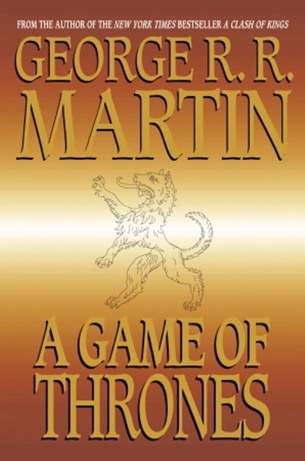 |
George R. R. Martin’s A Song of Ice and Fire has taken the world by storm. The complex – and still unfinished – series of novels has earned high praise for its gritty (sick of that word yet?) and realistic portrayals of love (sex), war (blood) and political maneuverings (backstabbing). R. R. Martin’s writing style adopts a no-holds-barred approach that is as far a cry from R. R. Tolkien’s work as you could imagine. And yet, much like the whole of the fantasy genre, the dense continents of Westeros and Essos owe their genesis to Middle-earth, even if they present a much more cynical view of it.
Still, let’s not forget who brought the Seven Kingdoms to the dance in the first place, as it goes without saying that Martin’s genre-defying story would never have infected popular culture as it has without the fantastic HBO adaptation that is currently in the midst of its fifth season. The premium show brings Martin’s characters and complex plot to life in a long-form storytelling manner that even Peter Jackson’s lengthy Lord of the Rings film trilogy could not approach, at least in terms of depth. Now, ordinary folks who otherwise wouldn’t have been caught dead in the Sci-Fi and Fantasy section of their local bookstore can’t get enough of the genre; if you weren’t already a fantasy nerd, HBO’s hit series has probably given you the itch, so why not scratch it?
Here are eight series you should give the time of day if you love Game of Thrones.
8. The Dark Tower (Stephen King)
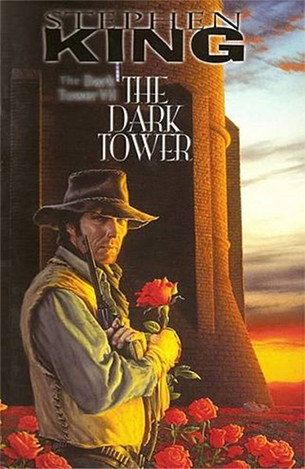 |
Stephen King is a love-him or hate-him type of author who is equally divisive among fans and critics. Some lambast his writing style for being overly wordy and his plots for meandering. Worst of all, he has some of the most head-scratching and, frankly, frustrating endings of any writer you can think of. With all that said, one could make the argument that King was writing dark fantasy before it was cool, and while the New England native is best known for his work in the horror genre, King’s magnum opus is actually celebrated by his fans as one of the best fantasy works out there, and that is The Dark Tower series.
As with any extremely lengthy fantasy series, distilling The Dark Tower’s plot into a few lines is far from simple, but we’ll give it a shot anyways. Essentially, the story follows a gunslinger named Roland Deschain as he travels across apocalyptic hellscapes, fantastical forests, alternate dimensions and converging timelines to reach a paradoxical construct known as – drum roll – the Dark Tower before rival and all-around evil dude Randall Flagg does.
King’s series can be frustrating on occasion – one book in the middle is a slog to get through – but if you see this thing through to its ending, you’re going to be rewarded with one of the most complex and original works of fantasy you’re ever likely to read. Additionally, if you’ve read King’s other works, such as The Stand, Salem’s Lot and even The Shining, you’ll be treated to MCU-style Easter eggs throughout Roland’s journey.
This series blends old-style westerns with Arthurian legend and creature features to frighten, enthrall, enlighten and maybe even draw a tear or two before its gut-punch of an ending, which is about as divisive among fans as the author himself.
7. The Night Angel Trilogy (Brent Weeks)
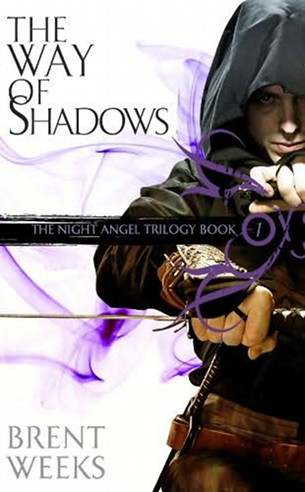 |
Now, I should start off by saying that, while I’m including The Night Angel Trilogy in this list, I’m actually not a fan of it. Still, I can’t ignore the gushing praise that has followed the series since its debut in 2008.
This is about as simple as dark fantasy gets. You’ve got your unlikely protagonist named Azoth (yes, Azoth) whose name is later changed to Kylar Stern. Kylar follows every trope in Joseph Campbell’s handbook, albeit with a dark twist. You see, he’s an assassin, trained by a master assassin, who takes odd jobs until getting tangled up in a complicated plot, a love triangle and rival assassins guilds en route to becoming a sort of fantasy take on Brandon Lee’s The Crow toward the end of Book 1.
If Book 1 is weak and predictable, the second and third legs of the journey show Weeks’ maturation as a writer. The plot transcends its assassin-focused trappings to take on the world of courtly politics before finally bringing our protagonist face to face with godlike forces in a truly grand finale. Basically, imagine an entire trilogy focused on characters from the Game of Thrones city of Braavos, the House of Black and White and the faceless men within.
The plot is relatively simple, the characterizations somewhat thin and the motivations lacking depth, but the action scenes are fantastic and, despite early stumbles, the series improves dramatically from book to book. Weeks is now one of the emerging names in the resurgent fantasy genre, and he’s certainly worth paying attention to.
6. The Black Company (Glen Cook)
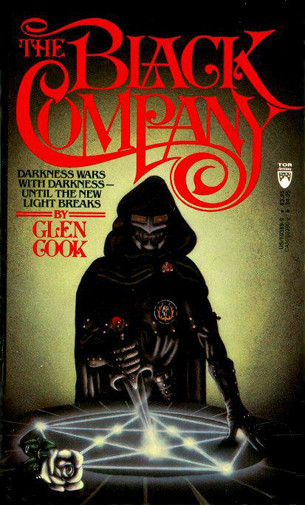 |
After you’re read the Night Angel Trilogy, consider stepping back in time and up in quality to the writer who clearly gave Weeks his first creative epiphany – Glen Cook, the dark fantasy mastermind behind The Black Company.
Where Game of Thrones is expansive, each individual novel in The Black Company feels tight and focused. Still, taken as a whole, the nine-book series explores a forty-year time period focusing on an elite and complex mercenary company within a bleak and violent world. At this point, it’s clich? to say, but there really are no heroes in Cook’s works, and yet, every character thinks he or she is following the righteous path en route to what usually amount to tragic and sudden ends.
The nine novels can be grouped into three story arcs or sagas: The Books of the North, The Books of the South and The Books of the Glittering Stone. Each gets stranger than the last, and while The Books of the North are arguably the best in the series, diehard fans of Cook’s work argue that following the journey through to its ending rewards readers with the type of bleak catharsis only dark fantasy can give.
All fantasy novels have common elements, but Cook’s claim to fame is his realistic and vivid descriptions of military campaigns. If you enjoyed Stannis Baratheon’s militaristic machinations (Red Woman included) during the War of the Five Kings, the Black Company is right up your alley. If you hated that aspect of Martin’s second novel, stay far away from this one.
5. The Acts of Caine (Matthew Woodring Stover)
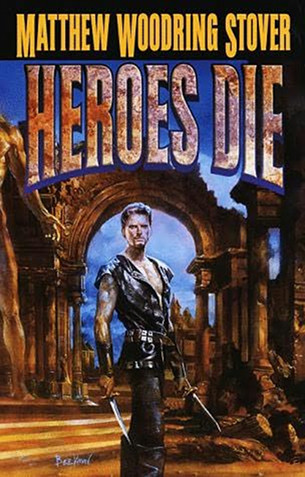 |
Matthew Woodring Stover is, for better or worse, best known for his work in the now sorta-defunct Star Wars Expanded Universe, having penned popular standouts such as Shatterpoint, Traitor and the official novelization of Revenge of the Sith.
If you have read those (better yet, if you haven’t), do yourself a favor and pick up Stover’s criminally underrated and unknown fantasy series, The Acts of Caine. There have been four novels in the Caine series thus far, and each is so varied from the last that the only common element tying them together is the protagonist himself.
As for said protagonist, Hari Michaelson, known simply as Caine on Otherworld (we’ll get to that) is one of the most original and, frankly, badass characters in the sci-fi or fantasy genre, despite the fact that the cover for Heroes Die, the first book in the series, resembles an erotic novel you’d find on your aunt’s dresser.
The basic premise of Stover’s ingenious creation finds Michaelson surviving on a dystopian earth that’s about a stone’s throw away from Orwell’s darkest nightmares. After the discovery of an alternate and Tolkien-like Otherworld, Earth’s filthiest and richest corporations monetize the entertainment value of the planet by sending “actors” to role-play adventures in the dangerous and fantastical lands. Michaelson is one of the most famous actors in the world, and his alter ego, Caine, is a deadly assassin responsible for some of the highest-rated sagas in Otherworld’s history.
Here’s the thing: in Otherworld, actors actually become their characters. As Caine, Michaelson has assassinated kings, rescued princesses and engaged in epic battles that have earned him nerdgasmic titles such as “Black Knife” and “The Blade of Tyshalle.” Essentially, he’s LARPing, only for real.
Stover’s series kicks in long after Caine has had his most famous adventures, but the series is all the better for it, and it’s best to go in completely cold.
PLEASE read this one.
4. The Gentlemen Bastards (Scott Lynch)
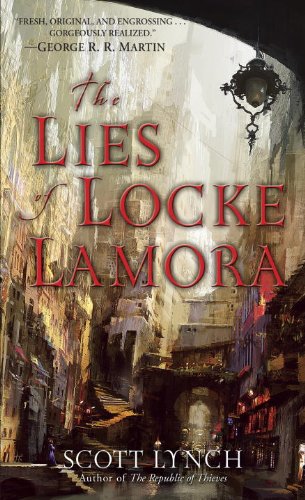 |
The Lies of Locke Lamora may be one of the most impressive fantasy debuts, well, ever, and that’s saying something. The 2006 novel sees Locke lead a ragtag but extremely formidable group of companions – the titular Bastards – on an astounding mission to rob the noble-infested city of Camorr.
Aside from Locke, the intelligent, charismatic and capable everyman, you’ve got Jean Tannen, a badass among badass fighters; the Sanza brothers, identical twins and useful in any situation; and a young and seemingly innocent apprentice named Bug.
This novel blends elements of the best heist films with clever subversions of fantasy tropes to make something that stands out as being wholly unique and refreshing in the genre. Imagine having an entire series following the exploits of Sir Bronn of the Blackwater, and you’ll have some idea what you’re in store for.
My only hesitation with recommending Scott Lynch’s series is the fact that it remains unfinished at three books out of a planned seven in total. Sound familiar?
The relative quality of the second and third novels is debatable, as Lynch went through a bad breakup that left him shattered and depressed for several years. Luckily, recent signs are pointing to him having pulled his head out of his ass and gotten back to work, as The Thorn of Emberlain, book four in the series, is due out later this year.
3. The Malazan Book of the Fallen (Steven Erikson)
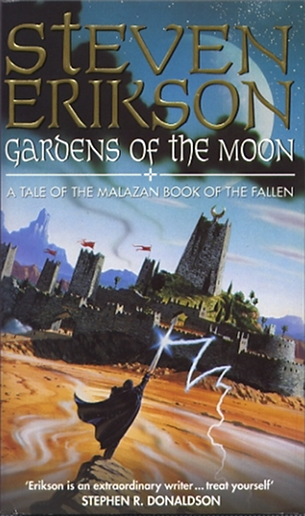 |
The Malazan series has such a hardcore and passionate fan base, I’ll frankly be shocked if I don’t have death threats for not putting it in the top spot on this list. Forget all the political backstabbing and intrigue of Game of Thrones; if you’re looking for an epic, continent-spanning saga that makes Westeros look like the Shire, this is the series for you.
Notoriously dense and far from beginner friendly, this isn’t a series to recommend to any by the hardest of the hardcore fantasy lovers – the black belts of the book shelf, if you will. To make matters worse, the first book, Gardens of the Moon, is widely considered to be the worst in the series, the quality of which picks up considerably in Book 2: Deadhouse Gates and remains remarkably consistent for the remainder of the 10-novel marathon.
As for what it’s about – that’s … hard to say. You see, there isn’t a central protagonist, and many of the novels only connect to one another in the sense that they take place in the same world, among the same gods, between some of the same nations. That scope could be held up as a glaring weakness in an otherwise superb series, but Erikson’s fans will defend it as rather unprecedented and entirely with purpose in the capable Canadian author’s hands. And they wouldn’t be wrong.
There are some truly gut-wrenching moments scattered throughout The Malazan Book of the Fallen, which, poignantly, lives up to its name, killing central characters almost as often as Game of Thrones.
Most importantly, however, this series is DONE. That’s right; Erikson set out to turn in the epic saga of all epic sagas, and his creativity, attention to detail and lifespan (RIP Robert Jordan) did not waver from beginning to end.
(Please leave aforementioned death threats in the comments below.)
2. The Broken Empire Trilogy (Mark Lawrence)
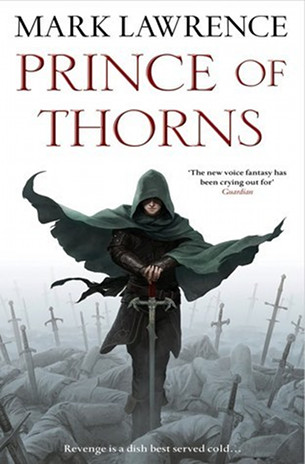 |
You’ve got your British authors and you’ve got your American authors, but why not add a mix of both to your life? That is exactly what you’ll get with Mark Lawrence, an American-born novelist who moved to England at a young age and now resides in the appropriately grim land of primeval forests and silly hats.
Not sure where I was going with that last part.
Anyways, if you’re a fan of Jaime Lannister’s character arc in Game of Thrones (it’s my personal favorite), then you’ll absolutely adore what Mark Lawrence has done with The Broken Empire Trilogy, a new addition to the fantasy world that blew the doors off the genre when it burst onto the scene in 2011.
The Broken Empire follows Jorg Ancrath, the son of a once-noble family that has lost all ties to the crown and now leads a broken and basically evil band of young thieves, rapists and murderers in the wild countryside. Jorg eventually discovers his royal lineage and decides to try to take back his throne, and the core struggle within the audience is whether or not we want him to succeed.
In a few short years, Lawrence’s central character has become one of the most popular and divisive in the history of the genre, inhabiting the gray area of human nature exclusively; he is neither good nor evil, but the product of his violent environment and his own Machiavellian ambitions. The true pain of the character comes through in his private ruminations, as well as in the actions he takes and doesn’t take on the road to the crown.
Lawrence is a brilliant wordsmith and a prolific one, releasing one novel a year since Prince of Thorns debuted four years ago. Get on the bandwagon, and get ready for some feels.
1. The First Law Trilogy (Joe Abercrombie)
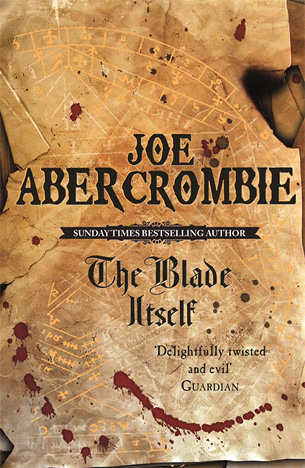 |
Joe Abercrombie, known both affectionately and derisively as the “Prince of Grimdark” among avid fantasy readers, is the current rock star of the fantasy genre. If George R. R. Martin is A New Hope, Abercrombie is The Empire Strikes Back.
But that’s just, like, my opinion, man.
Abercrombie burst onto the scene in 2006 with the release of The Blade Itself, a brutal, bloody and entertaining tale told in a split narrative. In it, we follow Logen Ninefingers, a barbarian from the north who is not all that he seems; Jezal Luthar, a spoiled swordsman sorely in need of a wake-up call; Ferro Maljinn, a wild and deadly woman on the run; and Sand dan Glokta, a cripple and a torturer, and a character you will hate at the start only to love above all others by the end.
Admittedly, The Blade Itself may be Abercrombie’s weakest work, but that’s good news if you stick with the series, as the second book, Before They Are Hanged, ups the stakes only to rise to an epic crescendo in the grand finale, Last Argument of Kings.
What I like most about Abercrombie’s stories is that, while death can and will find central characters, they all get their moments to shine – something a certain GRRM doesn’t seem to believe in.
If you’re still hungry for more Abercrombie at the close of his debut trilogy, his standalone novels, Best Served Cold, The Heroes and Red Country, all of which are set in the same world, are even better.
In short, you’re welcome.
Previously by Steven Kelliher:
The 10 Best Video Game Cinematic Trailers (for Terrible Games) of All Time
